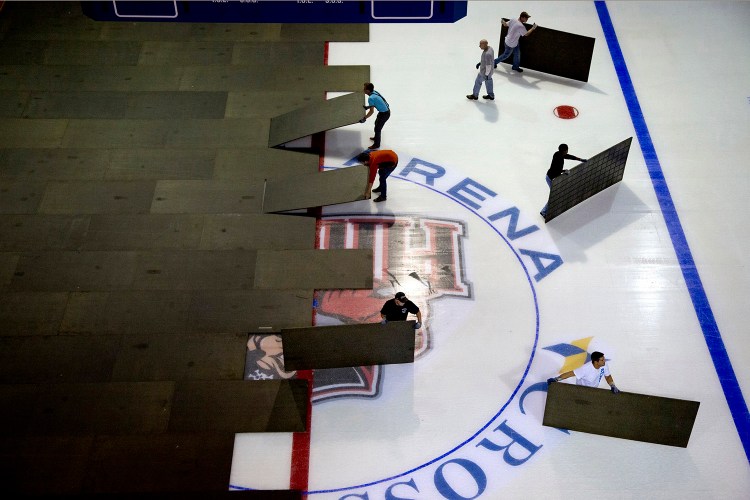When lease renewal talks between the Portland Pirates and the Cumberland County Civic Center trustees were at an impasse in late 2013, the Portland Regional Chamber stepped in, urging both sides to get back to the table.
The reason? The chamber was worried about the economic impact of the Pirates playing elsewhere, because it would mean thousands of fans would not be going into downtown Portland, filling bar stools and restaurant tables on more than three dozen winter nights.
“We’ve been here before,” Chris Hall, the chief executive officer of the chamber said Wednesday after learning the that American Hockey League team had been sold and was moving to Springfield, Massachusetts.
Seven years ago, when negotiations were similarly snarled, the Pirates encouraged speculation that they might leave Portland. Albany, New York, had just lost an AHL team and was eager to get a prime tenant for its arena. That worried the business community over the possible loss of events to draw people to the city at a typically slack time of year.
Hall said the concerns now are the same as they were during those two periods – the impact of lost sales in Portland bars and restaurants and the hit on county taxpayers, who are paying back $34 million in bonds that funded a renovation of the arena and are legally required to cover any operating losses that the arena incurs – $600,000 last year.
“It puts pressure on the civic center,” which is now called Cross Insurance Arena, Hall said.
Nominally, the arena gets $1,000 a game in rent from the Pirates. But the financial arrangements are much more complicated. The lease signed in early 2014 also calls for the hockey team to pay the arena’s expenses on game days and for the two sides to split things like concession revenues, advertising income and some naming rights.
Mitchell Berkowitz, chairman of the arena’s board of trustees, said he couldn’t estimate how much the county earns from each game.
In January, according to a financial report on the arena, there was one more hockey game than budgeted during the month, and that, combined with higher-than-anticipated attendance, brought in $17,413 more in hockey revenue than had been budgeted. However, the report doesn’t break out hockey revenue from other event income.
The relationship with the hockey team “has been extremely fruitful and beneficial,” Berkowitz said, adding that the news of the Pirates’ departure came as a surprise.
In the event the team breaks the lease, provisions in the agreement limit the damages the arena can claim to $100,000. Berkowitz said he didn’t know if the team could pay the $100,000 and break the lease, saying the trustees would meet with their lawyer Thursday morning to discuss the situation.
Berkowitz said trustees are worried about the financial impact from the loss of the arena’s lead tenant.
“We’re still struggling to bring us out of the red and into the black,” he said, suggesting that it has been difficult to book concerts, ice shows and other performances that will boost revenue for the arena. Having more than three dozen additional open dates a year won’t make that task easier.
At Binga’s Stadium, a chicken wings restaurant and bar across Free Street from the arena, manager Elena Corliss said hockey games bring in reliable crowds at an otherwise slow time of the year.
She said the fans are usually families who buy meals before going to games. Concert-goers, she said, are more typically couples who might have a beer before taking in the show.
Corliss said weekend games usually draw bigger crowds than weekday games, but said she didn’t think the loss of the Pirates would have a devastating impact on the bar-restaurant. Three years ago, when the Pirates played in Lewiston while the Portland arena was renovated, Binga’s wasn’t forced to lay anyone off despite a drop in business.
This time, she sees a small bright spot in the team’s departure.
“It will help our parking situation,” she said.
Send questions/comments to the editors.



